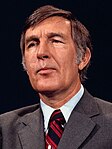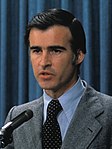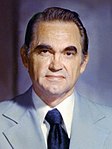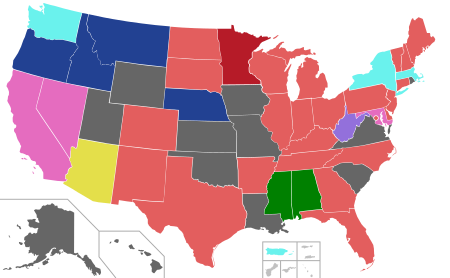
A | B | C | D | E | F | G | H | CH | I | J | K | L | M | N | O | P | Q | R | S | T | U | V | W | X | Y | Z | 0 | 1 | 2 | 3 | 4 | 5 | 6 | 7 | 8 | 9
| |||||||||||||||||||||||||||||||||||||||||||||||||||||||||||||
3,010 delegates to the 1976 Democratic National Convention 1,506 (majority) votes needed to win | |||||||||||||||||||||||||||||||||||||||||||||||||||||||||||||
|---|---|---|---|---|---|---|---|---|---|---|---|---|---|---|---|---|---|---|---|---|---|---|---|---|---|---|---|---|---|---|---|---|---|---|---|---|---|---|---|---|---|---|---|---|---|---|---|---|---|---|---|---|---|---|---|---|---|---|---|---|---|
| |||||||||||||||||||||||||||||||||||||||||||||||||||||||||||||
Carter Udall Brown Jackson Wallace Church Humphrey Byrd Uncommitted | |||||||||||||||||||||||||||||||||||||||||||||||||||||||||||||
| |||||||||||||||||||||||||||||||||||||||||||||||||||||||||||||
From January 27 to June 8, 1976, voters of the Democratic Party chose its nominee for president in the 1976 United States presidential election. Former Georgia governor Jimmy Carter was selected as the nominee through a series of primary elections and caucuses culminating in the 1976 Democratic National Convention held from July 12 to July 15, 1976, in New York City.
The primaries took place after the Watergate scandal and the subsequent Democratic landslide in the 1974 midterm elections, and going into the presidential election in 1976, the Democratic Party stood a strong chance of recapturing control of the White House. Hoping to avoid a repeat of 1972, Democrats chose the Centrist governor of Georgia, Jimmy Carter, to reclaim the Solid South and win back northern working class voters. Carter was nominated by the convention and he ultimately defeated President Gerald Ford by a narrow margin, marking the 1976 Democratic primaries the only time between 1968 to 1992 that a Democratic nominee has won a presidential general election.
Background
1972 election
In 1972, Senator George McGovern seized the Democratic nomination through an early campaign and superior organization, aided by his inside knowledge of the reforms under a commission he chaired. McGovern, widely seen as an extremely liberal candidate, lost the general election in an historic landslide to incumbent Richard Nixon, carrying only the state of Massachusetts.
Watergate scandal
During the 1972 campaign, several men were arrested for a break-in at the Watergate complex, home of the Democratic National Committee headquarters. As the investigation continued, it became clear that the break-in was one of several tactics utilized by the Nixon campaign against their political opponents. The scandal and the subsequent attempt to cover it up eventually forced President Nixon to resign from office under political pressure and the threat of impeachment. Nixon was succeeded by Gerald Ford, whom he had appointed to the Vice Presidency after Spiro Agnew himself resigned under investigation for bribery.
As a result of the Watergate scandal and other scandals, the American withdrawal from Vietnam, and an ongoing economic recession, the Democratic Party won a major landslide in the 1974 midterm elections. The post-Watergate political environment also led to a tightening of campaign finance regulations, the creation of the Church Committee to investigate abuses by federal intelligence agencies, and a general opposition to Washington and establishment politicians.
Pre-campaign maneuvering
Much of the speculation for the 1976 nomination surrounded Senator Hubert Humphrey of Minnesota, formerly Vice President of the United States and the party's nominee in 1968. Humphrey had won the largest number of votes in the 1972 primaries but lost in a bitter fight with McGovern. Though Humphrey ultimately declined to seek the nomination again, many early votes went to uncommitted delegates who supporters hoped would commit to Humphrey by the time of the convention.
Senator Scoop Jackson raised his national profile by speaking out on Soviet Union–United States relations and Middle East policy regularly, and was considered a front-runner for the nomination when he announced the start of his campaign in February 1975. Jackson received substantial financial support from Jewish-Americans who admired his pro-Israel views, but Jackson's support of the Vietnam War resulted in hostility from the left wing of the Democratic Party.
Jackson chose to run on social issues, emphasizing law and order and his opposition to busing. Jackson was also hoping for support from labor, but the possibility that Hubert Humphrey might enter the race caused unions to offer only lukewarm support.[1][2][3][4]
The 1976 campaign was the first presidential campaign in which the primary system was dominant.[citation needed] However, most of the Democratic candidates failed to realize the significance of the increased number of primaries, or the importance of creating momentum by winning the early contests. Jimmy Carter, who was virtually unknown at the national level, leveraged his obscurity to run as an "outsider" to Washington. Carter's plan was to run in all of the primaries and caucuses, beginning with the Iowa caucuses, and build up momentum by winning "somewhere" each time primary elections were held.
Schedule and results
Tablemaker's Note:[a]
| Date | Total pledged delegates |
Contest and total popular vote |
Delegates won and popular vote | |||||||||||||||||
|---|---|---|---|---|---|---|---|---|---|---|---|---|---|---|---|---|---|---|---|---|
| Other(s) Unpledged | ||||||||||||||||||||
| January 19 | 0 (of 47) | Iowa Caucuses 39,039 |
10,764 (27.57%) |
- | 2,340 (5.99%) |
- | 5,148 (13.19%) |
- | - | 3,861 (9.89%) |
- | 429 (1.10%) |
- | 1,287 (3.30%) |
- | - | - | - | - | 15,210[b] (38.96%) |
| January 24 | 0 (of 24) | Mississippi Caucuses[c][5] 1,482.13 CDs |
203.96 CDs (13.76%) |
- | - | 661.36 CDs (44.62%) |
- | 23.16 CDs (1.56%) |
- | 15.61 CDs (1.05%) |
- | - | - | 177.87 CDs (12.00%) |
- | - | - | - | - | 400.17 CDs (27.00%) |
| February 7 | 0 (of 37) | Oklahoma Caucuses[d][6] 7,186 CDs |
Zdroj:https://en.wikipedia.org?pojem=1976_Nevada_Democratic_caucuses||||||||||||||||||









